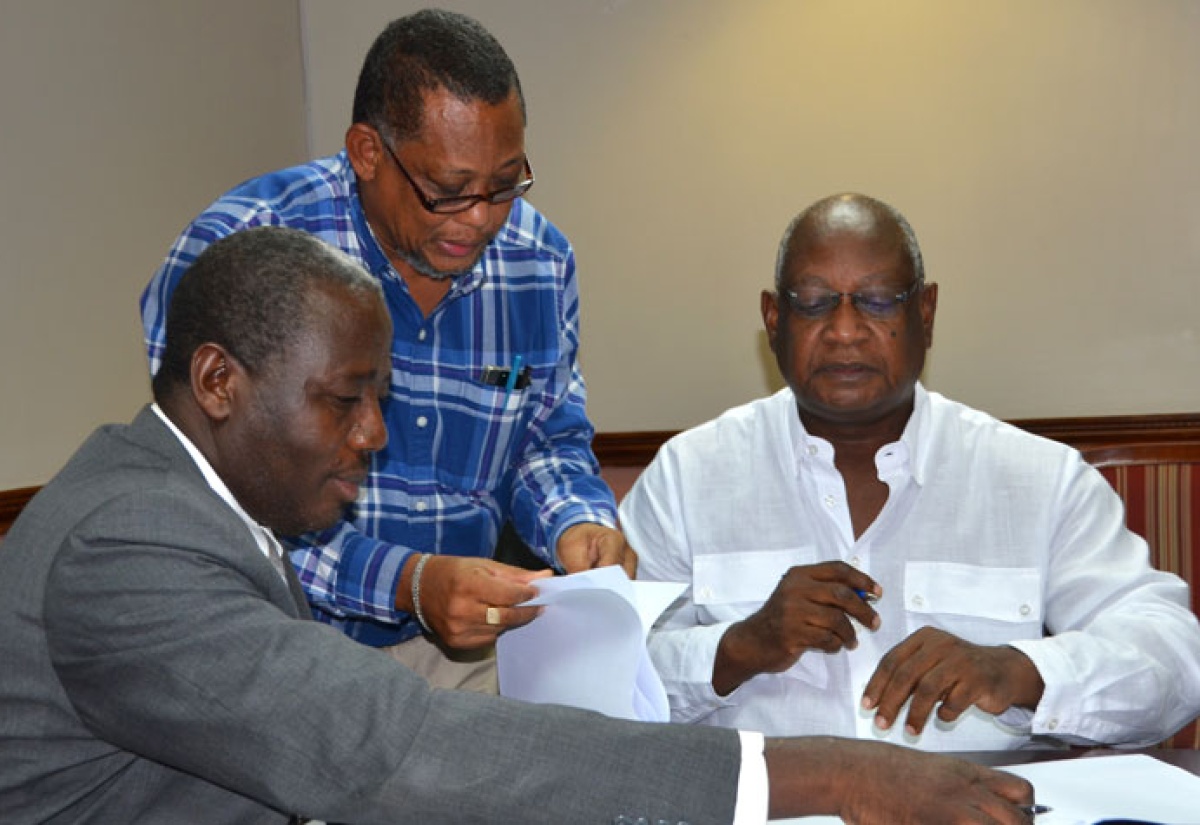Experts to Undertake Case Studies on Climate Change Vulnerability
By: , July 17, 2015The Key Point:
The Facts
- Contracts for the undertaking were signed by four consultants, along with Permanent Secretary in the Ministry of Water, Land, Environment and Climate Change, Dr. Alwin Hales, during a ceremony at the New Kingston offices of the Ministry, on July 16.
- The studies will be carried out as part of the Government’s ongoing work in preparing Jamaica’s Third National Communication and First Biennial Update Report to the United Nations Framework Convention on Climate Change (UNFCC), to which the country is party.
The Full Story
Local experts are to undertake a series of 15 case studies, to assess the country’s level of vulnerability and adaptation to climate change, and recommend measures to lessen the risks identified.
Contracts for the undertaking were signed by four consultants, along with Permanent Secretary in the Ministry of Water, Land, Environment and Climate Change, Dr. Alwin Hales, during a ceremony at the New Kingston offices of the Ministry, on July 16.
The consultants are: Physicist and Climatologist, Professor Anthony Chen; Executive Chairman and Principal Consultant, Conrad Douglas and Associates Limited, Dr. Conrad Douglas; Director, Climate Studies Group, University of the West Indies, Mona, Professor Michael Taylor; and Lead Consultant, Third National Communication, Dr. Donovan Campbell.
The studies will be carried out as part of the Government’s ongoing work in preparing Jamaica’s Third National Communication and First Biennial Update Report to the United Nations Framework Convention on Climate Change (UNFCC), to which the country is party.
Specifically, they seek to measure Jamaica’s net emissions of greenhouse gases, mainly carbon dioxide, methane and nitrous oxide as well as assess the measures being undertaken to facilitate adaptation to the impacts of climate change.
Explaining the process, Project Administrator, Third National Communication, Clifford Mahlung, said the studies are to be conducted in the five sectors that have been identified as being most vulnerable to climate change.
Three studies each are to be done in the agricultural, water resources, human health, coastal resources, and tourism sectors, he said.
“So, we’ll be doing those assessments to see just exactly how vulnerable we are to those risks, and then we’ll be looking at measures to minimise those risks,” Mr. Mahlung explained.
The Third National Communication is being implemented by the Climate Change Division in the Ministry. It is a document, which Mr. Mahlung contends is very important, as it provides information on the country in terms of its national circumstances.
“(It provides information on) things like our economic indicators for the past five or six years; population changes, all very important information with respect to the country itself. We look at the climate, and how it has changed,” he added.
For his part, Dr. Hales stressed that it is of critical importance that Jamaica completes this exercise, post-haste, and that the outcomes expected are realised, as the country prepares for the Conference of the Parties, which is to be held later this year in Paris.
“We are pleased to have some very capable and qualified professionals at our disposal in the (consultants) and we are sure that we will get not only the best quality, but also that the work items will be completed in a timely fashion,” he said.
The country’s Initial Biennial Update report, which was submitted to the UNFCCC in 2014 and the Third National Communication, which is to be submitted in 2017, are requirements Jamaica has to fulfil as party to the Convention.
Some of the expected outcomes from submitting the report include: further strengthening of the technical and institutional capacities of Jamaican institutions to implement the Convention, as well as the provision of support for the integration of climate change considerations into national and sectoral development priorities.
It is also expected to continue the implementation of awareness activities on climate change for targeted audiences, including students, teachers, teacher trainers, government officials, members of the private sector, non-governmental organisations, civil society and the general public.
The project is expected to build a national consensus to facilitate activities to mainstream climate change issues into relevant social, economic, scientific and environmental policies, programmes and strategies. It will also assess the vulnerability to climate change of additional communities that will be identified and prioritised for potential adaptation options in a series of case studies.
The initial national communication was submitted in November 2000 and included a greenhouse gas inventory for the reference year 1994, and vulnerability and adaptation assessments for the agricultural, water, and coastal zone sectors.
The second national communication included greenhouse gas inventories for 2000 to 2005, which were prepared using the updated 2006 Intergovernmental Panel on Climate Change (IPCC) inventory guidelines. It also assessed climate change impacts for key sectors, including health, human settlements and tourism, and revisited agriculture, water and coastal zones for the years 2015, 2030 and 2050.


